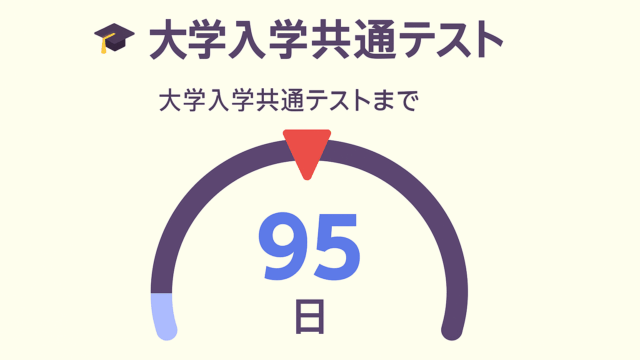
早慶上智・超難関大学で出題される英単語をズバリ200予想します!クイズで楽しみながら覚えてしまいましょう!!
早慶上智・超難関大学英単語200リスト
| 英単語 | 日本語訳 | 例文 | 補足・用法 |
|---|---|---|---|
| activist | 活動家 | Environmental activists organized a rally to protest the new policy. | environmental activist(環境運動家)のように分野名を冠する。 |
| affluent | 裕福な、富裕な | Affluent societies often grapple with issues of waste and overconsumption. | affluent society(豊かな社会)などで使う。 |
| agenda | 議題 | The committee meeting agenda includes topics on sustainability. | have an agendaで「下心がある」の意も。 |
| albeit | 〜ではあるが | He finally agreed to the plan, albeit with some hesitation. | although と同義。 |
| algorithm | アルゴリズム | The search engine uses a sophisticated algorithm to deliver relevant results. | 9世紀の学者アル=フワーリズミーの名に由来。 |
| allege | 主張する | The article alleges that the company engaged in unfair practices. | alleged criminal(容疑者)の形容詞形が頻出。 |
| alleviate | 緩和する | The new medicine helped alleviate the patient’s chronic pain. | elevate・levity と同語源。 |
| allocate | 割り当てる | The committee will allocate funds to each department based on need. | allocate A to B / be allocated to ~。 |
| altruism | 利他主義 | Her decision to volunteer in the refugee camp was motivated by pure altruism. | egoism の対義語。 |
| ambivalent | 相反する感情をもつ | He felt ambivalent about moving abroad. | ambi(両方)+valent(価値)。 |
| ameliorate | 改善する | The government implemented new policies to ameliorate the effects of the economic downturn. | melior「より良い」に由来。 |
| anomaly | 例外、異常 | The latest data revealed an anomaly. | 統計で外れ値を指すことも。 |
| anthropocene | 人新世 | Many scientists argue that human impact marks the beginning of the Anthropocene. | anthropo(人)+-cene(新しい時代)。 |
| antithesis | 正反対 | Her calm personality is the antithesis of her brother’s temper. | thesis⇔antithesis→synthesis の弁証法。 |
| archeological | 考古学の | Archeological discoveries have shed light on ancient civilizations. | 英綴りは archaeological。 |
| aspiration | 熱望 | Her aspiration is to become a diplomat. | 動詞 aspire から派生。 |
| assault | 暴行 | The soldier was court-martialed for assaulting a civilian. | assault and battery(暴行と傷害)。 |
| assert | 断言する | The professor asserted that the theory was supported by data. | assertive(自己主張の強い)も頻出。 |
| automate | 自動化する | Many factories are trying to automate production. | 名詞 automation。 |
| autonomous | 自治の | The country has several autonomous regions. | autos(自己)+nomos(法)。 |
| autonomy | 自主性・自治 | Students desire greater autonomy over their schedules. | 自らを律する能力。 |
| belligerent | 好戦的な | The belligerent tone of the debate blocked compromise. | belligerence(好戦性)。 |
| benevolent | 慈悲深い | The company’s benevolent founder donated half of his wealth to charity. | benevolence(慈愛)。 |
| biodiversity | 生物多様性 | Climate change poses a threat to biodiversity in the rainforest. | 生態学の重要概念。 |
| capricious | 気まぐれな | The weather in the mountains is capricious. | capricious weather の形が定番。 |
| catastrophe | 大災害 | A large asteroid impact could cause a global catastrophe. | catastrophic(壊滅的な)。 |
| caveat | 但し書き | He approved the plan with one caveat: finish by month-end. | with the caveat that ~ の形。 |
| characterize | 特徴づける | He characterized the era as one of rapid technological advancement. | characterize A as B。 |
| chauvinism | 狂信的愛国主義 | The novel critiques the chauvinism of the era. | male chauvinism(男性優越主義)も。 |
| clarify | 明確にする | Could you clarify what you mean by ‘academic freedom’? | clarify one’s statement など。 |
| clash | 衝突する | Cultural values can sometimes clash when students study abroad. | culture clash(文化衝突)。 |
| collaborate | 協力する | Scientists from different fields collaborated on the study. | collaboration(協力)。 |
| comply | 従う | All students must comply with the university’s code of conduct. | comply with ~。 |
| conscience | 良心 | His conscience wouldn’t allow him to ignore the unfair treatment. | pangs of conscience(良心の呵責)。 |
| conscientious | 良心的な | She is a conscientious researcher. | conscience に由来。 |
| consciousness | 意識 | Philosophers debate how brain processes give rise to consciousness. | lose / regain consciousness。 |
| consecutive | 連続した | She won the championship for three consecutive years. | three consecutive days など。 |
| conservation | 保存・保護 | Conservation of wetlands is crucial. | environmental conservation など幅広い。 |
| consistently | 一貫して | He has consistently performed well. | consistently high quality など。 |
| conspicuous | 目立つ | Her red coat made her conspicuous in the crowd. | conspicuous consumption(顕示的消費)。 |
| constrain | 制約する | Our choices were constrained by the limited budget. | be constrained by ~。 |
| consumerism | 消費主義 | The film critiques modern consumerism. | 過剰消費志向への批判で用いられる。 |
| contemplate | 熟考する | Researchers must contemplate the ethical impact. | ラテン語 contemplari が語源。 |
| contend | 争う・主張する | Some scientists contend that climate change is accelerating. | contend that S+V / contend with ~。 |
| conundrum | 難問 | The origin of the universe remains a profound conundrum. | puzzle, enigma に近い。 |
| countless | 数えきれない | She has made countless contributions. | countless times の形で。 |
| coverage | 報道・適用範囲 | The media coverage of the election has been extensive. | insurance coverage(補償範囲)など。 |
| credibility | 信頼性 | The credibility of the witness was questioned. | cred-(信じる)語根。 |
| culpability | 過失責任 | The investigation aimed to determine the culpability of each executive. | culpable homicide など法律用語。 |
| curb | 抑制する | The new policy aims to curb excessive spending. | 馬具の curb が語源。 |
| cynical | 冷笑的な | Many voters have become cynical about politics. | キュニコス派に由来。 |
| deforestation | 森林破壊 | Deforestation in the Amazon continues to accelerate. | 熱帯雨林伐採の環境問題。 |
| demographic | 人口統計の | The demographic shift toward an older population will impact the economy. | demographic change など。 |
| deontology | 義務論 | In deontology, morality is judged by rules, not outcomes. | カント倫理学が代表例。 |
| desertification | 砂漠化 | Unsustainable farming has led to desertification in the Sahel. | 森林伐採・過放牧による土地荒廃。 |
| dialectical | 弁証法的な | The philosopher used a dialectical approach to reach a synthesis. | thesis-antithesis-synthesis の流れ。 |
| dichotomy | 二分法 | The speech highlighted the dichotomy between rich and poor. | false dichotomy(誤った二分法)。 |
| discourse | 談話 | The book examines the discourse surrounding free speech. | discourse analysis(談話分析)。 |
| disregard | 無視する | The company showed a disregard for environmental regulations. | in disregard of ~ の形も。 |
| distort | 歪める | The statistics were distorted to give a false impression. | distort the truth など。 |
| dogma | 教義・独断 | He challenged the prevailing dogma of his religion. | dogmatic(独断的な)。 |
| domain | 領域 | This question falls outside the domain of physical science. | 専門分野や活動領域の意。 |
| dubious | 疑わしい | I am dubious about the claims made in that advertisement. | dubious distinction(ありがたくない栄誉)。 |
| ecosystem | 生態系 | Coral reefs are a delicate ecosystem. | IT文脈で「産業エコシステム」にも。 |
| egalitarianism | 平等主義 | The constitution aimed to promote egalitarianism. | 平等な権利を求める思想。 |
| empirical | 経験的な | We need more empirical evidence. | theoretical と対比。 |
| empiricism | 経験主義 | Empiricism holds that knowledge comes from sensory experience. | rationalism と対比。 |
| empowerment | エンパワーメント | Education is a tool for the empowerment of disadvantaged communities. | women’s empowerment など。 |
| enact | 制定する | Parliament enacted a new law to protect consumer data. | enactment(制定)。 |
| enlightenment | 啓発 | The book provided enlightenment on complex issues. | the Enlightenment(啓蒙時代)。 |
| ephemeral | つかの間の | Fashion trends are ephemeral. | ephemeral beauty(儚い美)。 |
| epistemology | 認識論 | The course on epistemology examines what knowledge is. | episteme + -logy。 |
| epistemological | 認識論的な | He raised epistemological questions about reality. | epistemology の形容詞形。 |
| equity | 公平 | They strive for equity in educational opportunities. | equality との違いに注意。 |
| ethics | 倫理学・倫理 | The course covered medical ethics in detail. | work ethics など。 |
| exacerbate | 悪化させる | Sending troops could exacerbate the conflict. | exasperate と混同注意。 |
| executive | 重役 | She interned under a senior executive. | execute(実行する)が語源。 |
| exert | 行使する | She needs to exert more effort. | exert influence(影響力を行使)。 |
| existentialism | 実存主義 | Existentialism emphasizes individual freedom and responsibility. | サルトル、カミュなど。 |
| explicitly | 明白に | The policy explicitly states that plagiarism is forbidden. | 反意語 implicitly。 |
| extrinsic | 外発的な | Extrinsic motivation can undermine intrinsic interest. | intrinsic の対義語。 |
| feat | 偉業 | Building the pyramids was an extraordinary feat. | no mean feat(大した偉業)。 |
| feminism | フェミニズム | Feminism advocates for equality between the sexes. | 第一波〜第四波など歴史あり。 |
| flawed | 欠陥のある | The theory was fundamentally flawed. | flawed argument の形で批判。 |
| foresee | 予見する | No one could foresee the rapid changes in technology. | anticipate と同義。 |
| glimpse | ちらりと見ること | The documentary offers a glimpse into endangered species’ lives. | catch a glimpse of ~。 |
| globalization | グローバル化 | Globalization has connected markets worldwide. | 文化の画一化への懸念も。 |
| hazard | 危険 | Smoking is a serious hazard to your health. | hazardous(有害な)。 |
| healthcare | 医療 | Access to affordable healthcare is a major issue. | health care と2語表記も。 |
| hedonism | 快楽主義 | The protagonist abandons hedonism for a meaningful life. | hedonist(快楽主義者)。 |
| hegemony | 覇権 | Cultural hegemony is evident in global media. | cultural hegemony の用例。 |
| heterogeneous | 異質な | The classroom was a heterogeneous mix of students. | homogeneous の対義語。 |
| heuristic | ヒューリスティックな | Using a simple heuristic, she found a solution quickly. | ユーザビリティ評価で用いる語。 |
| hinder | 妨げる | Frequent disruptions hindered the meeting’s progress. | hamper, impede と同義。 |
| hindsight | 後知恵 | In hindsight, we underestimated the competition. | Hindsight is 20/20. |
| holistic | 全体論的な | The doctor took a holistic approach. | holistic medicine など。 |
| homogeneous | 同質の | Rural communities are often more homogeneous. | heterogeneous の対義語。 |
| humiliate | 恥をかかせる | He felt humiliated when his mistake was pointed out. | humilis(低い)が語源。 |
| ideology | イデオロギー | The party’s ideology appealed to young voters. | 1796年仏哲学者が造語。 |
| idiosyncratic | 独特な | His idiosyncratic teaching style was unforgettable. | idiosyncratic habit など。 |
| immense | 非常に大きな | The library’s collection is immense. | huge, enormous のフォーマル形。 |
| imperative | 急務の | It is imperative that we address climate change. | imperative mood(命令法)。 |
| impetus | 推進力 | Oil provided the initial impetus for economic boom. | change の impetus など。 |
| implicitly | 暗黙に | He implicitly trusted her judgment. | explicitly の対義語。 |
| inadvertent(ly) | 不注意にも | I inadvertently deleted a file. | accidentally のフォーマル形。 |
| incline | 傾ける/したい気にさせる | I am inclined to agree with you. | be inclined to ~。 |
| inhibit | 抑制する | Stress can inhibit memory functions. | inhibitor(阻害剤)。 |
| innate | 先天的な | Researchers debate whether language is innate. | innate talent など。 |
| inquisitive | 好奇心旺盛な | The inquisitive child asked endless questions. | 肯定的に用いる。 |
| integral | 不可欠な | Honesty is an integral part of her character. | an integral part of ~。 |
| intrigue | 陰謀/興味をそそる | The plot is filled with political intrigue. | 動詞は「興味をそそる」。 |
| intrinsic | 本質的な | Volunteering has intrinsic rewards. | extrinsic の対義語。 |
| invoke | 引用する/発動する | Activists invoked the Constitution to defend their case. | invoke a law の形。 |
| juxtapose | 並置する | The exhibition juxtaposes modern and classical art. | juxtapose A with B。 |
| juxtaposition | 並置 | The film’s juxtaposition of comedy and tragedy impressed audiences. | 対照を生む技法。 |
| legacy | 遺産 | The professor left a rich legacy of research. | legacy of colonialism など。 |
| legitimate | 正当な | She raised legitimate concerns. | legitimize(正当化する)。 |
| lest | 〜しないように | He hid the notes, lest someone steal his ideas. | 否定目的の接続詞。 |
| liberty | 自由 | Freedom of speech is a fundamental liberty. | Liberty Bell など政治的文脈多い。 |
| malevolent | 悪意のある | A malevolent witch cursed the princess. | benevolent の対義語。 |
| marginalize | 疎外する | Policies can marginalize minority students. | 受動態で使われること多い。 |
| marginalized | 疎外された | Voices of marginalized groups are being heard. | the marginalized(当事者)とも。 |
| metamorphosis | 変貌 | The city underwent a complete metamorphosis. | 昆虫の変態・劇的変化。 |
| metaphysical | 形而上学的な | The poet employs metaphysical imagery. | metaphysics の形容詞形。 |
| methodology | 方法論 | The paper’s methodology section explains procedures. | 研究手法の体系を指す。 |
| mitigate | 緩和する | Planting trees can mitigate carbon emissions. | mitigate risk/damage。 |
| monopoly | 独占 | Laws prevent a monopoly in telecom. | monos+polein が語源。 |
| multiculturalism | 多文化主義 | The festival celebrated multiculturalism. | カナダの公式政策など。 |
| nascent | 発生期の | The regional tech industry is nascent but growing. | nascent industry の形。 |
| nihilism | 虚無主義 | He fell into nihilism after the war. | ニヒリズムとも表記。 |
| normative | 規範的な | Distinguish descriptive vs. normative statements. | normative ethics 等で用いる。 |
| notwithstanding | 〜にもかかわらず | Notwithstanding the difficulties, she continued. | 前置詞・接続詞・副詞すべて可。 |
| nuanced | 微妙な差異のある | Her opinion was nuanced. | 単純化できない多面的分析。 |
| ontology | 存在論 | Ontology asks what kinds of things exist. | metaphysics の一分野。 |
| orthodox | 正統的な | He holds an orthodox view on economics. | unorthodox の対義語。 |
| paradigm | パラダイム | Relativity changed the paradigm of physics. | paradigm shift で有名。 |
| paradoxical | 逆説的な | It’s paradoxical that wealth brings both obesity and malnutrition. | paradox(逆説)派生形容詞。 |
| paraphrase | 言い換える | Students had to paraphrase a paragraph. | paraphra- は「脇に言う」。 |
| paternalism | 温情的支配 | Critics see the law as paternalism. | 父権的に自由を制限。 |
| patriarchy | 父権制 | The novel shows a dystopian patriarchy. | フェミニズムで批判対象。 |
| peasant | 小作農 | The story follows a medieval peasant family. | フランス語由来。 |
| perpetuate | 永続させる | Stereotypes can perpetuate unfair norms. | 否定的文脈で多い。 |
| pertain | 関係する | The rules pertain only to graduate students. | pertain to ~。 |
| pervasive | 蔓延した | Smartphones have become pervasive. | pervasive corruption など。 |
| phenomenology | 現象学 | Husserl’s phenomenology analyzes structures of experience. | ハイデガーなどへ影響。 |
| plausible | もっともらしい | Her explanation sounds plausible. | 賞賛に値するが語源。 |
| pluralism | 多元主義 | Democracy requires pluralism. | religious pluralism など。 |
| ponder | 熟考する | He pondered the question for a long time. | ponder over ~ の形も。 |
| posthumous | 死後の | Her novel was published posthumously. | posthumous award など。 |
| pragmatism | 実用主義 | His pragmatism favored solutions that worked. | 米国哲学・柔軟姿勢も。 |
| preclude | 妨げる | This evidence precludes the need for further investigation. | preclude A from ~ing。 |
| predominantly | 主に | The university is predominantly focused on research. | mostly とほぼ同義。 |
| preliminary | 予備的な | The report presents preliminary findings. | preliminary results など。 |
| preservation | 保存 | Historic preservation saved the theater. | conservation との違いに注意。 |
| presume | 推定する | We presume that participants have read the guidelines. | assume より根拠を示唆。 |
| proliferation | 急増 | Experts fear the proliferation of misinformation. | arms proliferation など。 |
| proponent | 支持者 | He is a leading proponent of renewable energy. | opponent の対義語。 |
| prosperity | 繁栄 | The era was marked by peace and prosperity. | prosperous(形容詞)。 |
| rationalism | 合理主義 | Enlightenment thinkers promoted rationalism. | empiricism と対比。 |
| realm | 分野 | Her expertise lies in the realm of international law. | 本来「王国」の意。 |
| reiterate | 繰り返し述べる | She reiterated the rules after disruptions. | 強調のため再述。 |
| render | 〜にする | The thick walls rendered the room soundproof. | render + O + 形容詞。 |
| replicate | 再現する | The results were hard to replicate. | replication study(追試)。 |
| resilient | 回復力のある | The resilient community rebuilt after the earthquake. | resilient society など。 |
| restrain | 抑える | He could barely restrain his anger. | restrain oneself(自制する)。 |
| rhetoric | 修辞 | The speech was high on rhetoric but low on substance. | 美辞麗句にも否定的含み。 |
| salient | 顕著な | She summarized the salient points of the article. | salient points の形。 |
| sanctity | 神聖さ | Many cultures stress the sanctity of life. | sanctity of marriage 等。 |
| scarcity | 希少性 | Water scarcity is a pressing issue. | 基本経済概念。 |
| scope | 範囲 | The scope of the project was wider than expected. | within the scope of ~。 |
| scrutiny | 精査 | The policy is under public scrutiny. | be under scrutiny の形。 |
| secularism | 世俗主義 | The constitution enshrines secularism. | 政教分離原則。 |
| sentient | 知覚力のある | Could AI ever become truly sentient? | sentient beings(有情の存在)。 |
| simplistic | 安易な | His analysis was too simplistic. | 複雑さを無視して単純化。 |
| simulate | 模擬実験する | Engineers simulated flight conditions. | simulation(名詞)。 |
| sociologist | 社会学者 | The sociologist studied migration patterns. | sociology の専門家。 |
| spur | 駆り立てる | His speech spurred the audience into action. | 拍車をかける → 動機付け。 |
| stringent | 厳格な | The lab follows stringent safety protocols. | stringent standards など。 |
| subjective | 主観的な | Artistic taste is highly subjective. | objective の対義語。 |
| surge | 急増 | There was a surge in online demand. | a surge in ~。 |
| surveillance | 監視 | More surveillance cameras sparked a privacy debate. | mass surveillance など。 |
| susceptible | 影響を受けやすい | Children are more susceptible to the virus. | be susceptible to ~。 |
| sustainability | 持続可能性 | The university committed to sustainability initiatives. | SDGs 文脈で重要。 |
| systematic | 体系的な | They took a systematic approach. | systemic と混同注意。 |
| systemic | 構造的な | Activists call for systemic change. | systemic racism など。 |
| taboo | タブー | Talking about death is a taboo subject. | 文化的禁忌事項。 |
| taxation | 課税 | The platform proposed progressive taxation. | 税制度全般。 |
| tenet | 信条 | Compassion is a core tenet of Buddhism. | tenets of Islam など。 |
| thinker | 思想家 | Descartes was a profound thinker. | great thinkers の形。 |
| transcendental | 超越的な | Kant’s transcendental idealism shapes our reality. | カント哲学で先験的の意。 |
| ubiquitous | 至る所にある | Smartphones have become ubiquitous. | ubiquity(名詞)。 |
| unfold | 展開する | We watched the drama unfold live. | 物語・事件が進展。 |
| unprecedented | 前例のない | The pandemic led to an unprecedented lockdown. | on an unprecedented scale。 |
| unsustainable | 持続不可能な | Current resource use is unsustainable. | 環境・経済文脈で。 |
| unwarranted | 不当な | The CEO’s confidence was unwarranted. | unwarranted assumption など。 |
| utilitarian | 実利的な | Her design taste is utilitarian. | utilitarianism(功利主義)関連。 |
| utilitarianism | 功利主義 | Utilitarianism seeks the greatest happiness for the greatest number. | J.S.ミルらが確立。 |
| vulnerable | 脆弱な | Personal data is vulnerable to theft. | vulnerability(名詞)。 |
| xenophobia | 外国人嫌い | Policies showed blatant xenophobia against immigrants. | xenophilia の対義語。 |
| zeitgeist | 時代精神 | The film captured the zeitgeist of the 1960s. | ドイツ語由来。 |






